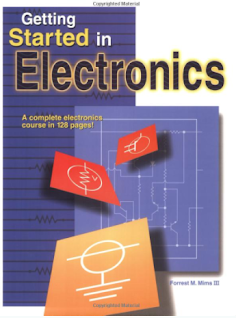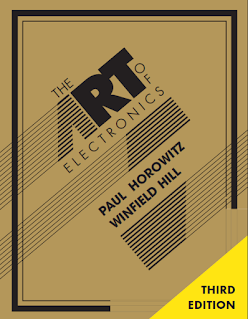Electronic books with Kindle editions
A wonderful variety of electronic books. Those who have a very basic knowledge of electronic components. These books are very useful. You can understand the basic structure of the electronic components. These are helpful for theory and practical purposes. What is an electronics book and how to read it?
The book is called an electronic or E-book if it is available for online reading. It might be in pdf format and available to download.
Third Edition,
Writer - Forrest M Mims III
128 Pages

"Getting Started in Electronics" is a well-known beginner's guide to the basics of electronics. Authored by Forrest M. Mims III, this book is widely appreciated for its easy-to-understand approach to teaching electronics concepts, even to people with no prior experience.
Here’s what the book covers:
Basic Concepts:
The book introduces fundamental principles like voltage, current, resistance, and power in electronics. These are explained in simple language with illustrative diagrams.
Components:
It explains the function of basic electronic components like resistors, capacitors, diodes, transistors, and integrated circuits (ICs). Each component is described with hand-drawn diagrams and clear instructions on how they work.
Circuit Diagrams:
The book teaches how to read and understand circuit diagrams, which are the blueprints for building electronic devices.
Simple Projects:
Throughout the book, there are small projects and circuits that beginners can build, such as basic amplifiers, timers, or sensors. These hands-on activities reinforce theoretical concepts.
Testing & Troubleshooting:
It also gives advice on how to test components using tools like multimeters and explains how to troubleshoot and fix common problems.
Learn more about electronics !!!!!!!!!!!!!!!!
Third Edition,
Writer - Paul Horowitz & Winfield Hill
Chapters: 15 sections.

This beginner's guide is used for digital electronics projects, but we also use it as a reference book. The book is about the basics of electronic components work. It describes active, and passive filters (LC, RF).
Introduce timers by using Chip 555. A good tutorial on voltage regulation and power circuits. We also use the art of electronics as a textbook to design electronic projects and circuits.
The middle of the book describes digital logic concepts and logic gates. Knowledge of flip-flops, micro-controllers, interfaces, and software.
It covers digital-to-analog converters. In the last, it is about computers, and data links. It is a basic electronics book and also a practical electronics book for inventors. It is useful to study and understand electronics at a very basic level.
Fourth Edition,
Writer - Paul Scherz & Simon Monk
17 chapters, 1056 Pages
Amazon Kindle Books Edition
Practical electronics for inventors contain electronic component details. Also, symbols and color codes of electronic components. If you study electronics with very basic knowledge, it is quite useful.
You can learn about voltage, current, resistance, and inductance effects in the circuit. The book provides electronic Laws and theorems used for circuit analysis.
Discrete active circuits and passive circuit components. An outstanding book on electronic circuit analysis. Basic passive circuits and discrete circuits and integrated circuits.
How to share common ground with electronic equipment. Usage and deep analysis of LCR (inductor, capacitance, resistance) circuits.
Semiconductor material and components in serial and parallel circuits. The working principle of sensors. Where and how used, and the electronic sensors.
Various kinds of chemical sensors, e.g., gas, smoke, humidity. Measurement and analysis. How to operate an oscilloscope to measure signals.
These books have good electronic components literature from make electronics.
Volume 1
Writer - Charles Platt
Amazon Kindle app books Edition

Electronics Books of basic components
This book deals with the basic concepts of electronic components. We divide it into major categories.
1 - Power.
2 - Electromagnetics.
The book starts with the battery, which is an electrochemical power source. But a battery cell is also a power source for an electronic component. It describes the construction details, working principles, and usage of electronic components.
We used the most important components in many Arduino-based electronic projects. Resistors, capacitors, and inductors are used in almost every circuit. Such parts are explained in the book well.
Description of Transformers Power Supply, Converters, Inverter. It is useful for the required source of supply.
Switches, Relays, these parts are explained briefly in the book. These parts play a major role in any circuit.
The second category of the book is about motors, e.g., AC-DC motors, servomotors, and Stepper motors.
An Encyclopedia of electronics is best if you are starting projects with sensors and modules.
The first Volume covers power, electromagnetism, and discrete semiconductors.
Volume 2 includes incorporated circuits, and light and sound sources.
Volume 3 covers a variety of sensing devices.
Volume 2
Writer - Charles Platt
Amazon Kindle books Edition
The book keeps valuable information on integrated chips, transistors, Diodes, Heat & sound emitters. It explains a brief description of signal processing.
It explains the component function with their datasheet. Diagrams of components are very effective in learning quickly.
The 2nd edition covers a variety of indicators, displays, and light sources. LEDs, Seven-segment displays, LCD modules, dot matrix displays, and amplification circuits.
Types of LCD, Active matrix /Passive matrix LCDs. Types of Light bulbs or panel indicators. The book defines LEDs as per wavelength, Infrared.
Working principle and function of LASER light. how it works and how it is made and what is inside. Last, about audio indicators/ different transducers.
Speakers/headphone types as per frequency range. The book is not only giving knowledge about the usage of electronic components. Also explains the working principle, including internal diagrams.
1st Edition,
Writer - Charles Platt
Amazon Kindle Books Edition
This book is about electronic basic knowledge. It explains the basic function of electronic components. It provides practical usage of electronic components in our everyday life. It explains electronic devices used in electronic circuits.
This eBook is very effective to make electronic projects. Learn and use higher-level logic chips, comparators, and shift registers in circuits.
You can learn and understand light sensors, and magnetic sensors. You will understand topics like endemicity, audio amplification, and fantastic and negative feedback.
This e-book will assist you from Intermediate to advanced electronic standards and techniques.
Conclusion
Electronic books can be effective if you have electronic kits and start assembling them. Because practice made man perfect, just start the experiment and learn through your mistakes.




